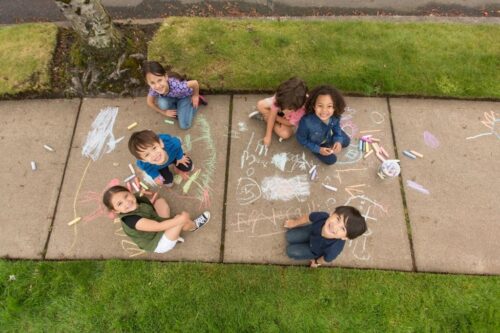Should Siblings Share Play Dates?
If you have more than one child, you know that play dates can be tricky instead of peaceful, especially when kids get a little older and don’t want their siblings to interfere.
The question I’ve been getting is what should parents do when their kids have a friend over for a play date? Should the older child get alone time with their friend? Or should everyone play together?
Table of Contents
Many parents tell stories of younger siblings feeling left out, crying, and whining, while older siblings try to keep younger ones out of the room so they can have some alone time with their friends. Parents feel bad for the younger kids, but they also aren’t sure whether it’s okay to force the older kids to play with their younger siblings.
This can get even trickier if you were forced as a child to include your siblings and resented it. Or if you were the excluded child from your sibling’s play dates. So what’s the right thing to do here?
If you search the internet for an answer, you will find all kinds of opinions, including from experts, ranging from everyone has to be included to absolutely keep the younger sibling out of the older one’s play date. I don’t find this helpful at all. So today, I thought about putting in my own two cents in the hope of helping you decide what to do.
Important reminder!
First of all, I would like you to remember that you are the expert on your family. I really mean this. So you need to take everything you read about, including in this article, and sift it through your own wisdom and knowledge of your children. There are many tips and pieces of advice out there, but not all will apply to your family. It’s important for you to trust yourself and your judgment and to carefully select what you know will work for you.
Why do we get play date conflicts?
There could be many reasons why kids don’t want to include their siblings in their play dates with friends. I will point out just a couple here.
1. Sibling rivalry
Oftentimes, play date conflicts happen when there is also sibling rivalry in the family. The kids don’t feel bonded enough and there is a sense of scarcity between them. As a result, they get a sense of power and significance when they get a friend all to themselves. And at the same time, they are less likely to feel empathy for their sibling who is scratching at the door.
On the flip side, when kids feel close to each other, they are more likely to enjoy playing together, to include their siblings, and to want to share their friends with them. They are more empathetic and they stand up for one another.
So it’s very important to work on building a strong relationship between siblings.
Related: How to Reduce Sibling Fights Easily
The other thing that you might want to teach your kids is that the way that they treat each other sets the tone for their friends for how they should treat their siblings. To give you an example, if your older child is mean to their younger sibling or excludes them from play, that can give their friends permission to be mean to your younger child. On the other hand, if your child is kind and respectful to their sibling, that will encourage their friends to treat them the same. Kids need to understand that they can set the tone for how their siblings are treated by others and they should model kindness and respect for their friends.
2. Kids need power
When kids exclude others from play, it can be a misguided way to feel powerful. It tells me that they may feel like they don’t have a lot of power and control over their lives. Especially as kids grow older, they need to feel more autonomy.
If you notice your child frequently excluding their sibling from play, try to notice if there are other areas where they may be looking for power as well. And then, find healthy ways for them to have power in their daily life. Give them opportunities to make choices and involve them in age-appropriate decision-making for themselves or the whole family.
3. Age difference
If the age gap between your children is too big, then I don’t recommend asking the older child to include the younger one in their play date. The interests would be way too different and the older child would be babysitting their sibling and that just wouldn’t be fair.
There are also safety concerns there. So I would say keep little kids out of big kids’ play dates.
With that said, let’s see some of the things that you can do to make play dates more enjoyable for everyone.
Plan ahead
The most important thing that you need to do is to build a foundation. If you try to get your kids to listen to you when they’re triggered and activated, it’s not going to work!
You know how this goes. Your oldest child has their friend over and they want to play just the two of them, but the younger sibling wants in on the fun. The tension grows, and the voices get louder, but you try to stay calm and keep the peace. You tell your older child to not exclude your youngest, and at the same time, you try to tell your younger kid to come and do something fun with you. But they cry, don’t want to do anything else, whine, and complain. You feel annoyed and helpless. It just doesn’t work.
But if you spend enough time ahead of time to develop your family culture, create your family’s play date rules, build relationships within your family, and make sure that everyone is invested in the outcome, then your kids are more likely to listen to you when you make a suggestion or remind them of your family plan during the play date.
Decide on your family rule
The biggest problem that I see is that parents aren’t clear and confident about where they stand. They are tentative and hesitant and children can sense this.
So the first step is to decide on your family rule. This is like a general umbrella under which your family operates. There are two options here. Decide if you want play dates to be individual or inclusive. It is up to you to decide on your family rule. This is a value-based decision and also a logistical one.
Values
Do you believe in every person having the right to separate time and friendships, away from the rest of the family? Or do you believe that family comes first and everyone has to be included? It’s your choice.
Logistics
And then there are the more practical aspects. Take some time to think about what would realistically work for your family. Can you keep the other child occupied or entertained? Can you schedule a separate play date for them at the same time as their sibling having their friend over? Or is there no way for you to do any of that and you have to have all the kids playing together?
I feel like the parents deciding to have all kids play together are more likely to feel judged, pressured, or even bullied online. And I want you to know that there is no reason for you to allow other people’s opinions to make you feel bad about your parenting decisions. Again, just because something works for some families doesn’t mean it will work for all.
We all know that families aren’t cookie-cutter systems and parents juggle multiple things so oftentimes it’s hard to have separate play dates simultaneously for each kid or to keep one busy while the other is having fun with their friend.
Whatever you choose, ensure you are certain it’s what you want to do, and you commit to it and believe in your choice.
So first, decide what is important for you and what you want for your family.
Implement the rule
Next, make sure that everyone is familiar with your family rule and abide by it.
Clearly communicate the family rule
Communicate it to your own kids and to the kids coming over for play dates.
Children are used to having different sets of rules in different areas of their lives and they are very capable of adapting and respecting them. They know that at school they have to raise their hand if they have a question, but understand that this rule doesn’t apply at home. So when they come into your house for a play date, it’s fine to let them know what rules exist in your home.
Be consistent
Enforcing a family rule has to be handled carefully. It takes time and training. Forcing kids to play with their sibling “just because I said so” is not a good way to go about it. It only leads to resentment. Children have to understand why we have a certain rule in our home, we have to make sure that we are applying this rule consistently in other areas as well, and we have to follow it too. We are the models for our kids and we show them how we expect them to show up.
Establish play date guidelines
Talk with your kids about what to do and what not to do during the play date. But instead of just informing them of the guidelines, invite them to a conversation. When children are involved in discussions and decisions, they are more likely to follow those guidelines. They feel like they had a say, they believe in the guidelines, and they have a sense of ownership.
Get your kids’ input
When deciding on your family’s play date guidelines, ask your kids, “How can we make play dates fun for everyone?” This idea comes from Adele Faber, coauthor of Siblings Without Rivalry. Then see what your children say. You will be surprised by how thoughtful and creative your kids are.
As you go through their ideas, ask them, “Is this respectful? Is this kind?” Asking these questions will help your kids think about respectful solutions for everyone. This is an effective way to get children to do the right thing. Because they all want to be good.
Once you have the play date guidelines, you can write them on a piece of paper and post them somewhere where they can be referenced during the next play date.
Remind everyone of the play date guidelines
One day before the play date, discuss with your kids how they can make sure that everyone has fun at the play date.
Next time someone comes over for a play date and before they all run off to play, go over the rules with them. You can ask your kids to remind everyone of the guidelines. This is also a good time to remind all the kids that if anyone has a hard time respecting the rules, even after attempts to redirect, then the play date stops for everybody.
When kids don’t respect the play date rules
In general, try to stay out of most disagreements. Kids are very capable of solving their own problems. However, use your best judgment, and if you notice that things are getting heated, then absolutely intervene.
In most cases, encourage children to work things out by talking respectfully. Teach them the 3 part assertiveness rule. But inform them that you will be nearby to help if they can’t work things out on their own.
The biggest piece of advice that I have here is to not ignore signs of meanness because kids will take that as a sign of your approval. You have to show that’s not ok in your family.
Having individual play dates
If you decide that your family values individual play dates, then there are some things you can do to help kids not feel excluded and abandoned.
One-on-one time
You can take your child who will not be participating in the play date and spend some special one-on-one time with them. You can bake cookies, paint their nails, or watch a movie. The idea is to do something special, that they might want more than hanging out with their sibling.
If you’ve been struggling to find time for Special Time, this would be the perfect time for you to do it. While one child is occupied with their friend, you can give your other child your full attention and love.
Enlist the help of another adult
If another adult is available, like a grandparent, another caregiver of the child, a babysitter, or a family friend, they can take your child to the park, an indoor play place (such as a trampoline park), or out for ice cream.
Schedule simultaneous play dates
Scheduling simultaneous individual play dates for all your kids requires a bit more planning on your part, but it is possible for you to coordinate with other families.
You can have both individual and inclusive play dates
Even if you decide that your family does inclusive play dates, that doesn’t mean that your kids can never have individual ones. If any of your kids want to have an individual play date, you can offer to take them to their friend’s house, provided you’ve cleared it with their friend’s parent.
My conclusion
In our family, play dates are inclusive. Besides not having the logistical capacity for individual play dates, my reasoning is that I prepare my kids for adult life. And as adults, if we visit a friend and there are other adults in their home, we don’t exclude them. If I want to spend time with my friend without other people, I invite them out for coffee or a walk. But I understand that, when I go to their house, I share my attention and energy with everyone present.
Again, this is what works for my family and it’s okay if you decide something different for yours. Just remember that, whatever you decide, you try to implement it with kindness.







